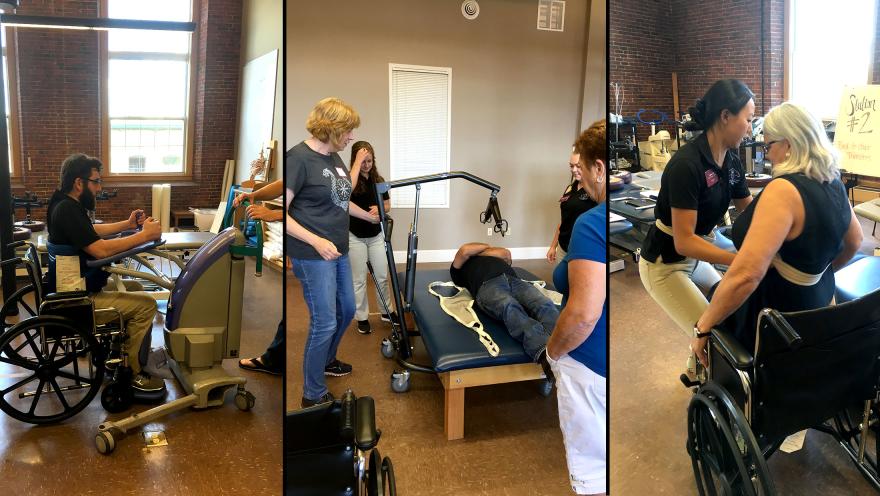Social distancing measures put in place in response to the COVID-19 pandemic created a unique dilemma for Amber Stalker. Stalker is director of care services for The ALS Association Northern New England Chapter, which runs a regular training seminar to teach caregivers how to use critical assistive living devices that enhance the quality of life for their loved ones living with ALS. Throughout the spring and summer, quarantine rules made it impossible to meet her caregivers and trainers in person.
But ALS will not stop during the pandemic, which means caregivers in Amber’s region can’t wait for the trainings to resume. We talked to Amber about the ALS Family Caregiver Lab and adjusting to service delivery during quarantine.
Families provide the majority of the long-term care for their loved ones in the United States, and the need for information and education is great. With an ALS diagnosis comes a long list of devices, technology, equipment and tools to help make every day in the home as comfortable and carefree as possible throughout the progression of the disease. For many, the learning curve to provide this care can be steep and often time daunting.
The ALS Family Caregiver Lab is a day-long workshop created for friends and family members caring for people with ALS. This program is designed to provide the education and training caregivers need to use equipment like Hoyer lifts, communication devices, and respiratory equipment safely to keep their loved one comfortable as they help them perform the basic daily tasks of living.
The chapter usually conducts the training at physical therapy schools or clinics. “It was an obvious place to hold them so we didn’t have to worry about getting the equipment like hospital beds or properly fitted bathrooms for demonstration because they were already there,” Amber said. With the aid of doctoral physical therapy students and additional health care professionals, participants learn about proper nutrition and feeding, basics on respiratory therapy, various communication methods and devices, as well as mobility and accessibility needs throughout the ALS journey.
“This is all delivered in an environment for them to receive hands-on instruction and be able to ask the really hard questions that sometimes they don’t feel comfortable asking in front of the person they are caring for,” said Amber. “It also allows for them time to meet with others like them and make connections with other families.”
Due to the pandemic, Amber and her team are in the process of reinventing the program to be able to provide the same type of instruction virtually through the help of technology using videos and Zoom calls. With the help of several physical therapy students from Franklin Pierce University, they are creating a series of videos and assessments for participants to watch and will be holding a series of virtual meetings for caregivers to ask questions about what they have watched and will hold open discussion and training virtually via Zoom.
“While it’s still work in progress, we’re excited about finding new ways to continue providing this type of education for our families,” Amber says. “And this new virtual opportunity will hopefully help us to reach even more caregivers throughout our region because they won’t have to travel or leave the home.”


Comments
My sister has a late stage ALS with approx 5-6 months to live. She is still able to care for herself. At some point in the near future I will be moving into her home to care for her needs. I'm searching for some form of training so I can do my best for Nancy. Videos, etc.
Thank you.
Hi Cynthia, our hearts go out to you and your sister.
You can find information about navigating living with ALS on our website: https://www.als.org/navigating-als.
You can find videos to help on our YouTube Channel: https://www.youtube.com/user/thealsassociation.
Your local ALS Association chapter can also provide free and personalized information, resources and support: als.org/chapters
No comment, just fact, learned how to use hoyer on my on , had very little help with tobii communication, about an hour, learned to change diapers, enema, anything to do with hygiene on my on, went to clinic multiple times, mostly to sell stuff, she's late stage now, hospice not much help, something needs to be done for caregivers, symptoms started in 2015, 12 Dr later diagnosed ALS 2018, it's tough right now, thanks for letting me vent
Join the conversation. Please comment below.